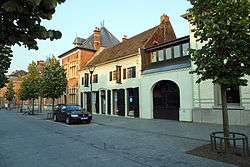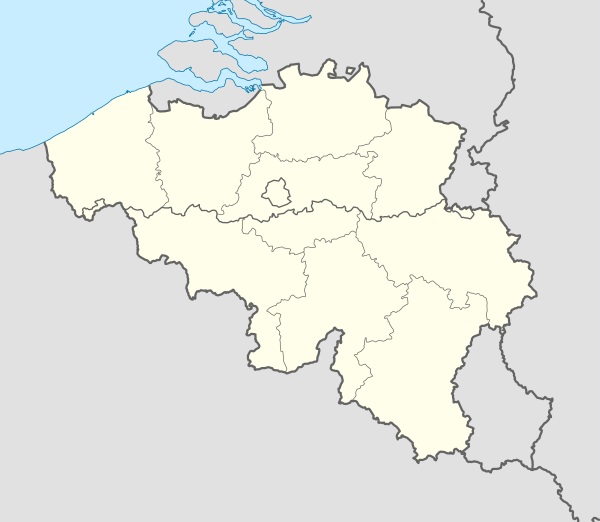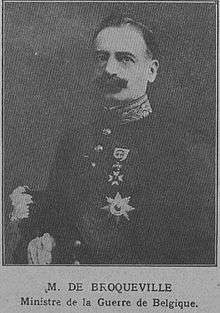Mol, Belgium
| Mol | |||
|---|---|---|---|
| Municipality | |||
 | |||
| |||
 Mol Location in Belgium
Location of Mol in the province of Antwerp  | |||
| Coordinates: 51°11′N 05°07′E / 51.183°N 5.117°ECoordinates: 51°11′N 05°07′E / 51.183°N 5.117°E | |||
| Country | Belgium | ||
| Community | Flemish Community | ||
| Region | Flemish Region | ||
| Province | Antwerp | ||
| Arrondissement | Turnhout | ||
| Government | |||
| • Mayor | Paul Rotthier (CD&V) | ||
| • Governing party/ies | CD&V, VLD | ||
| Area | |||
| • Total | 114.26 km2 (44.12 sq mi) | ||
| Population (1 January 2017)[1] | |||
| • Total | 36,151 | ||
| • Density | 320/km2 (820/sq mi) | ||
| Postal codes | 2400 | ||
| Area codes | 014, 011 | ||
| Website | gemeentemol.be | ||
Mol (Dutch pronunciation: [mɔl]) is a municipality located in the Belgian province of Antwerp. The municipality only comprises the town of Mol. On January 1, 2014 Mol had a total population of 35,395 inhabitants. The total area is 114.19 km² which gives a population density of 307 inhabitants per km².[2][3][4]
Mol is a popular holiday resort, with a number of lakes surrounded by woods. There are two main tourist lakes:
- Zilvermeer, which opened as a Provincial Park in 1959 and offers a white sand beach as well as facilities such as an outdoor playground and an underwater museum for divers.
- Zilverstrand: Originally, it had only an outdoor lake with a white sand beach. Later, a caravan park was built and mid-1990s an indoor swimming pool was created.
Furthermore, there is a Sun Parks holiday centre called "Kempense Meren" with an indoor swimming pool.
The museum of Jakob Smits is located in the former vicarage of Mol-Sluis. This displays works of the artist Jakob Smits (1855-1928) and other painters of the Molse School, who were attracted to the area by its rustic views including several windmills (of which only one remains).
In the north-east corner of Mol, near the Dutch border, lies the Norbertine Postel Abbey. Mol is also home to the SCK•CEN Belgian Nuclear Research Centre, the Flemish institute for technological research (VITO) and a European School. The first industries in Mol were the Vieille Montagne company and the explosive factory N.V. La Forcite. In 1872 the Sablières et Carrières Réunies (SCR), now Sibelco, was founded in order to extract the silica sand layers in Mol for industrial applications. The company became the global market leader in this sector with production sites all over the world.
The 15 chapels[5] were built by Pater Helsen in 1815 with 14 co-workers of the region. It is a protected monument.
Municipality structure
The municipality of Mol is divided in different townships respectively named:
Education
European School, Mol is located in the city.
Notable born or raised inhabitants
- Tom Boonen, professional cyclist, 2005 World Road Race Champion
- Nele Gilis, professional squash player, European junior champion, world no. 26 on PSA World Tour
- Tinne Gilis, professional squash player, European junior champion, world no. 50 on PSA World Tour
- Jo Gilis, professional footballer
- Filip Dewulf, tennis player, semifinalist in the French Open
- Kirsten Flipkens, tennis player
- Hadise Açıkgöz, former Pop Idol 2003 contestant, and now a singer
- Joël Smets, former motocross world champion
- Barbara Dex, singer
- Tanja Dexters, former Miss Belgium (1998)
- Ann Van Elsen, former Miss Belgium (2002)
- Wilfried Peeters, ex-cyclist, now groupsleader of cyclingteam Quick-Step
- Rob Peeters, cyclo-cross rider
- Henricus Smeulders, Abbot and pontifical delegate
- Zjef Vanuytsel, artist
- Guy Dufour, footballer
- Charles de Broqueville († 5 September 1940), former prime minister
- Johan Gielen (23 February 1968), professional DJ
- Viktor Lazlo (7 October 1960), singer and actor
- Tom Saintfiet (29 March 1973), football coach
Gallery
 Stone of the Seven Seigniories on the border of the municipalities of Mol and Lommel
Stone of the Seven Seigniories on the border of the municipalities of Mol and Lommel Edmond van Eetvelde, the right hand to Leopold II of Belgium
Edmond van Eetvelde, the right hand to Leopold II of Belgium
References
- ↑ Population per municipality as of 1 January 2017 (XLS; 397 KB)
- ↑ Statbel.fgov.be (see Mol)
- ↑ "Statbel.fgov.be" (PDF). Archived from the original (PDF) on 2008-04-11. Retrieved 2007-10-24.
- ↑ "Statbel.fgov.be" (PDF). Archived from the original (PDF) on 2008-04-11. Retrieved 2007-10-24.
- ↑ 208erbos.be
External links
| Wikimedia Commons has media related to Mol, Belgium. |


